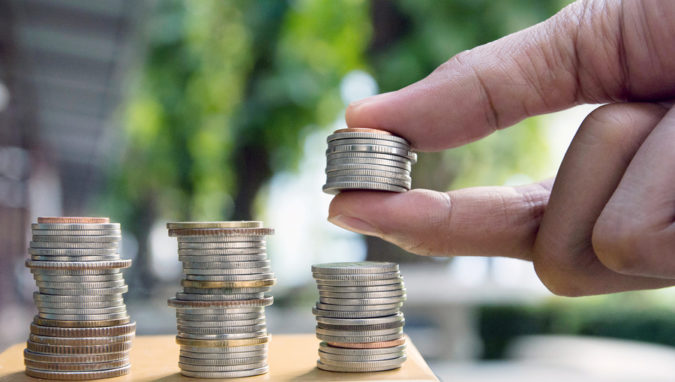The best way to calculate the proper amount to save is as a flat percentage of current income. I believe we all must consistently save at least 20% of our gross income if we ever want to get ahead financially and retire comfortably someday.
Everyone I have ever met who is financially independent, meaning that they have enough money to live a comfortable lifestyle without having to work, has consistently saved a significant portion of their income, many of them more than 20%. No other reliable way to accomplish this exists, except perhaps by means of an employer or government pension that guarantees payment of a significant portion of pre-retirement income for life. Still, most people I have met who are successfully living on pension income also regularly saved a large percentage of their income throughout their careers. Keep in mind that many pensions are facing severe financial difficulty, so even if we are entitled to a pension, we would be wise to save a substantial amount of our income in case it does not pay out as expected.
Ancient Wisdom for Saving
Consider a famous example in the Bible from thousands of years ago which illustrates the wisdom of saving at least 20% of our income. Joseph, the son of Israel who was sold by his brothers as a slave and then taken to Egypt, was the only man able to interpret Pharaoh’s troubling dreams. Joseph perceived that the dreams were actually warnings from God that there would be seven years of plenty followed by seven years of famine.
Joseph counseled Pharaoh to save a fifth part (20%) of all the food that was grown during the seven years of plenty so they would be prepared to survive the seven years of famine. Pharaoh followed Joseph’s advice, and everything occurred as he predicted. The Egyptians successfully survived the seven years of famine (see Genesis 41).
What can we learn from this example? Do we experience modern-day famines for which we need to prepare? Absolutely! One such famine could be called a “market decline.” Another could be called a “soft job market.” Haven’t the lingering effects of the Great Recession of 2008-2009 felt much like a modern-day famine? How different would things have turned out if we had all been saving 20% of our income instead of spending more than we made for several years leading up to the market crash of 2008?
The problem was not the fact that the market declined. Market declines have occurred often enough throughout history for us to know that they are to be expected. Although their timing and magnitude is unpredictable, they are simply a normal part of the economic cycle. The market crash of 2008 just happened to be a particularly dramatic decline because so many people, businesses, and governments were overleveraged and underprepared for the downturn. If everyone had been living on less than they made and saving 20% of their income, the decline would not have been nearly as severe.
The government has created all sorts of new legislation to try to prevent a similar tragedy from occurring again, but as long as greed and dishonesty exist, it will happen again. Hopefully next time it happens some of us will be better prepared for it. If we are prepared, we may actually experience it as a great investment opportunity rather than as a personal tragedy.
The famine in Egypt so long ago turned out to be an opportunity for Pharaoh to increase his wealth because he was so well prepared. Not only did he have enough to provide for himself and his people, but he also had sufficient surplus to sell corn to many starving people who came to him from surrounding regions because they were not prepared for the famine.
We have seen this same phenomenon during the Great Recession among those who were prepared. People who still had a lot of money after the crash because they were frugal in their expenditures and conservative with their investments while most other people were spending up a storm and taking tons of risk are now making a killing buying up real estate and other investments at very low prices. There is more money to be made during the bad times than during the good times for those who are prepared to capture the opportunity.
A Smart Saving Perspective
When things are going well, we have the tendency to believe they will always continue to go well. That is why we buy the biggest houses and the most expensive cars the banks will let us qualify for based on our current income. The minute our income goes up, we think we are entitled to even bigger and better things.
Would we buy such a big house if we knew that starting seven years from now we would be unemployed for seven years? How much of our current income would we be saving in preparation for such a famine? Would we be more motivated to curtail our spending habits?
Saving at least 20% of our income no matter what, and then living joyfully on the rest, gives us the shock absorbers we need when the good times stop rolling, and gives us hope for a comfortable retirement someday. If we are doing exceptionally well, we may choose to save much more than 20%. The Bible says, “And Joseph gathered corn as the sand of the sea, very much, until he left numbering; for it was without number” (Genesis 41:49). The more we save, the better off we will be in the future.
Adam Dawson, CFP® is a Principal at Capstone Capital and the author of Timeless Principles of Financial Security.
- Should You Invest At the Peak of the Stock Market? - August 5, 2021
- Our Thoughts on Bitcoin: Capstone Capital Wealth Advisors - May 12, 2021
- Are You Over-Insured? - September 12, 2017





